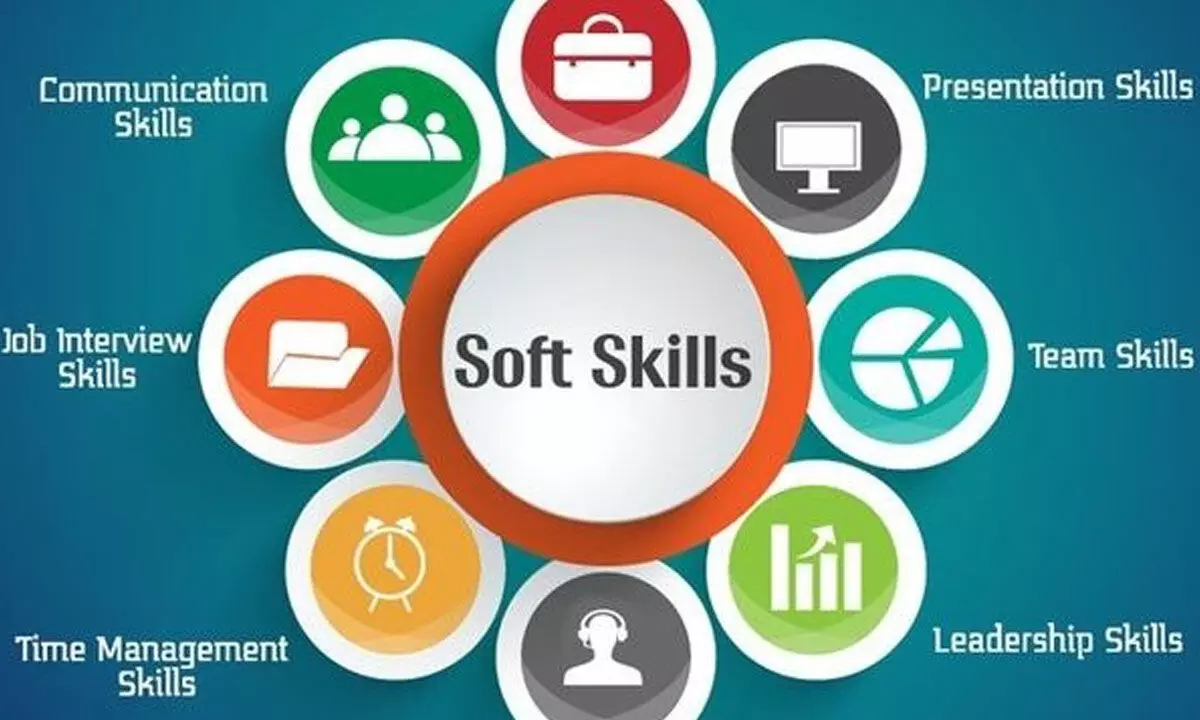Live
- Govt to launch 3 apps to protect consumers in digital marketplace
- NDA to fight Bihar polls with Nitish as CM face
- Allu Arjun refused to leave even after he was told of woman’s death
- Bareilly court summons Rahul Gandhi
- ‘Systematic conspiracy’ to undermine EC’s integrity: Kharge
- Popcorn tax slabs anger Congress
- India, Kuwait elevate ties to strategic level
- Nizamabad MP Dharmapuri Arvind and Jagtial MLA Dr. Sanjay Kumar Meet CM Revanth Reddy
- Hyderabad CP CV Anand Issues Stern Warning to Bouncers
- MP Laxman Criticizes Police Conduct, Calls for Support for Victims' Families
Just In
Why soft skills & training are essential for today’s students


As India aims to become a $10 trillion economy by 2030, the gap between academic knowledge and industry expectations is becoming increasingly evident.
As India aims to become a $10 trillion economy by 2030, the gap between academic knowledge and industry expectations is becoming increasingly evident. While universities and colleges are churning out graduates, the readiness of these students to meet real-world demands remains a point of concern. A report by HirePro revealed that while 70% of academic institutions believe their graduates are job-ready, only 16% of companies share that confidence. This disconnect is a clear indication that something crucial is missing—soft skills and targeted corporate training.
In the age of Industry 4.0, where automation and AI are rewriting the rules of employment, technical proficiency alone is no longer enough. Skills like effective communication, teamwork, and adaptability are just as important for career success. The ability to learn continuously and adjust to rapid shifts in the workplace has become an absolute necessity, yet these skills are often overlooked in traditional academic settings.
Demand for Soft Skills
Today, employers are not only looking for technical proficiency but also for candidates who can think critically, communicate effectively, and work well in diverse teams. According to LinkedIn, AI-related skills are among the most sought-after hard skills in India, yet companies still prioritize soft skills in hiring decisions. These skills are essential in roles where problem-solving, leadership, and adaptability to change are pivotal.
Industry 4.0, driven by AI and digital transformation, is fundamentally changing the way we work. A report by McKinsey predicts that automation could eliminate 800 million jobs by 2030, but it also anticipates the creation of 950 million new roles. Therefore, students need more than just academic knowledge—they must build a strong foundation of soft skills that enhance their technical abilities to succeed in this new era.
Role of Technology in Education
Also, technology is playing an important role in education. Virtual simulations, online learning platforms, and AI-based tools are making it possible for students to engage with complex subjects in interactive ways. According to forecasts, India’s EdTech market is set to reach $10 billion by 2025, indicating a growing demand for tech-driven, skills-based learning. These technologies enable students to access practical, job-oriented skills regardless of geographical location, ensuring that education is accessible and relevant to a global workforce.
Moreover, educational institutions are offering courses in emerging fields such as AI, data science, and cybersecurity. This integration of technology into the curriculum ensures that students are equipped with cutting-edge skills required by industries today and in the future. But without a focus on soft skills, even the most technologically proficient graduates may struggle to meet employer expectations.
Industry-Specific Skill Development
Different industries are experiencing growth that demands specific skill sets. The manufacturing sector is expected to create 11 million jobs in the coming decade, while the hospitality industry is projected to add over 8 million jobs by 2028. In sectors like BFSI (Banking, Financial Services, and Insurance) and healthcare, new roles will emerge, and soft skills will be crucial to excel in these fields.
For instance, customer-facing roles in hospitality or healthcare require not only technical proficiency but also the ability to communicate effectively, manage stress, and solve problems in real-time. Corporate training programs that focus on developing these interpersonal skills, alongside technical knowledge, can help prepare students for roles in high-growth sectors.
Corporate Training
One of the most effective ways to address the skills gap is through partnerships between universities and industries. These collaborations can provide students with internships, mentorships, and co-op programs that offer real-world experience. Internships serve as a testing ground for students, allowing them to apply their classroom knowledge to practical challenges, develop essential soft skills, and build professional networks.
Beyond technical training, corporate programs are increasingly emphasizing soft skills development. Workshops, seminars, and interactive activities focused on communication, teamwork, and leadership help students prepare for the demands of today’s job market. By immersing students in industry environments, these programs foster the kind of hands-on learning that traditional classroom settings often fail to provide.
The Economic Imperative
Preparing students for the future workforce is not just about individual success—it is a national economic priority. India, with its young and rapidly growing population, stands to benefit greatly from this shift. However, if students are not prepared with the right mix of soft and technical skills, these opportunities could be missed.
To succeed in Industry 4.0, students need more than technical skills. A balanced education that includes corporate training and soft skills is essential for future careers. As industries grow with new technologies, learning, adapting, and working well with others will be key to long-term success. Through partnerships with companies, technology integration, and hands-on experience, we can better prepare students for the challenges and opportunities ahead.
Soft skills are now a must-have for businesses. Employers want graduates who not only know AI, data analytics, or cloud computing but can also lead, communicate, and adapt to change. The future workforce must be flexible and ready to handle a rapidly changing global economy.
(The author is CEO of Scholars Merit)

© 2024 Hyderabad Media House Limited/The Hans India. All rights reserved. Powered by hocalwire.com






